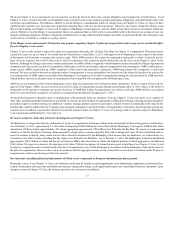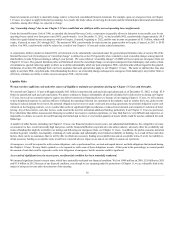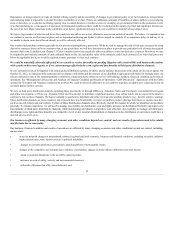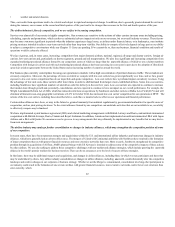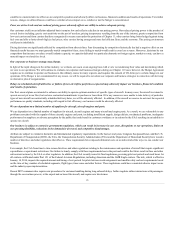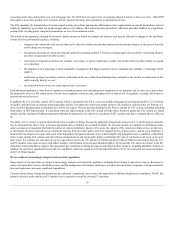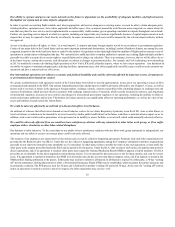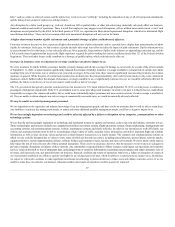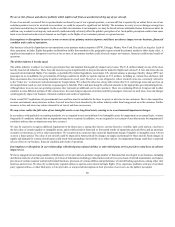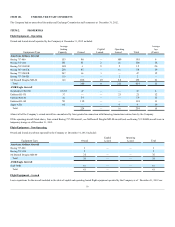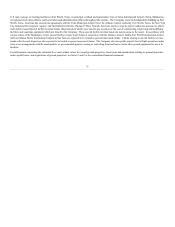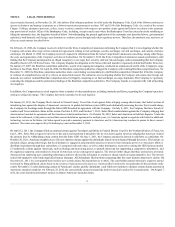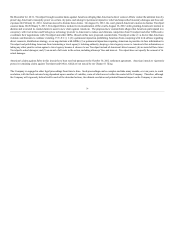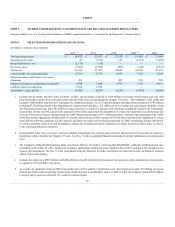American Airlines 2012 Annual Report Download - page 27
Download and view the complete annual report
Please find page 27 of the 2012 American Airlines annual report below. You can navigate through the pages in the report by either clicking on the pages listed below, or by using the keyword search tool below to find specific information within the annual report.
help,” such as a strike or other job action, and the airline may resort to its own “self-help,” including the imposition of any or all of its proposed amendments
and the hiring of new people to replace any striking workers.
Any disruption by a labor work group (e.g., sick-out, slowdown, full or partial strike, or other job action) may materially adversely affect our business,
financial condition and results of operations. There is a risk that employees may engage in such disruptions, with or without union involvement, even if such
disruptions are not permitted by the RLA. In the third quarter of 2012, we experienced a labor-related operational disruption, which led to substantial flight
cancellations and delays. There can be no assurance that such operational disruptions will not recur in the future.
A higher than normal number of pilot retirements and a potential shortage of pilots could adversely affect us.
From time to time in the past, we have experienced higher than normal rates of pilot retirements, and we currently have a higher than normal number of pilots
eligible for retirement. In the past, we had to reduce capacity and take other steps in an effort to reduce the impact of pilot retirements. If pilot retirements were
to exceed normal levels in the future, it may adversely affect us. More generally, large numbers of pilots in the industry are approaching retirement age, and the
FAA recently issued regulations that increase the flight experience required for pilots working for carriers certificated under Part 121 of the Federal Aviation
Regulations. These and other factors could contribute to a shortage of qualified pilots, which could adversely affect us.
Increases in insurance costs or reductions in coverage could have an adverse impact on us.
We carry insurance for public liability, passenger liability, property damage and all-risk coverage for damage to our aircraft. As a result of the terrorist attacks
of September 11, 2001, aviation insurers significantly reduced the amount of liability insurance coverage available to commercial air carriers for claims
resulting from acts of terrorism, war or similar events (war-risk coverage). At the same time, these insurers significantly increased the premiums for aviation
insurance in general. While the price of commercial insurance has declined since the period immediately after such terrorist attacks, in the event commercial
insurance carriers further reduce the amount of insurance coverage available to us, or significantly increase its cost, we would be adversely affected. In
addition, the failure or insolvency of one of our insurers could result in a lack of coverage.
The U.S. government has agreed to provide commercial war-risk insurance for U.S. based airlines through September 30, 2013, covering losses to employees,
passengers, third parties and aircraft. If the U.S. government were to cease providing such insurance in whole or in part, it is likely that we could obtain
comparable coverage in the commercial market, but we could incur substantially higher premiums and more restrictive terms, if such coverage is available at
all. If we are unable to obtain adequate war-risk coverage at commercially reasonable rates, we would be materially adversely affected.
We may be unable to retain key management personnel.
We are dependent on the experience and industry knowledge of our key management people, and there can be no assurance that we will be able to retain them.
Any inability to retain our key management people, or attract and retain additional qualified management people, could have a negative impact on us.
We are increasingly dependent on technology and could be adversely affected by a failure or disruption of our computer, communications or other
technology systems.
We are heavily and increasingly dependent on technology and automated systems to operate our business, reduce our costs and enhance customer service.
These technologies and systems include our computerized airline reservation system, flight operations system, financial planning, management and
accounting systems, telecommunications systems, website, maintenance systems and check-in kiosks. In order for our operations to work efficiently, our
website and automated systems must be able to accommodate a high volume of traffic, maintain secure information, and deliver important flight and schedule
information, as well as issue electronic tickets and process critical financial transactions, in a timely manner. The computer and communications systems on
which we rely could be disrupted due to various events, some of which are beyond our control, including natural disasters, power failures, terrorist attacks,
equipment failures, system implementation failures, software failures and computer viruses, hackers and other cyber attacks. We have taken certain steps to
help reduce the risk of some (but not all) of these potential disruptions. There can be no assurance, however, that the measures we have taken are adequate to
prevent or remedy disruptions or failures of these systems. Any substantial or repeated failure of these systems could impact our operations and customer
service, result in the theft or loss of important data, including private or sensitive information concerning our passengers and other customers, loss of
revenues, and increased costs, and generally harm our business, financial condition and results of operations. Moreover, a failure or disruption of certain of
our vital systems could limit our ability to operate our flights for an extended period of time, which would have a material adverse impact on us. In addition,
we expect we will need to continue to make significant investments in technology to pursue initiatives to reduce costs and enhance customer service. If we are
unable to make these investments, our business, financial condition and results of operations could be negatively impacted.
27


